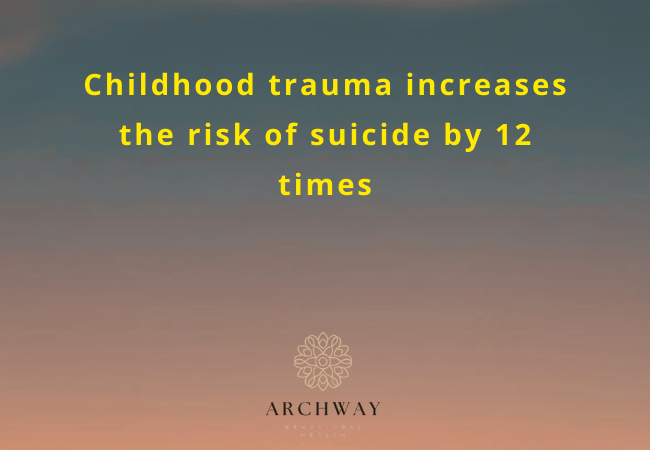Childhood is often idealized as a time of innocence and growth. However, for many individuals, it is marred by traumatic experiences that leave deep, lasting impressions. These adverse events can profoundly influence mental health well into adulthood, shaping behaviors, emotional responses, and overall well-being. Understanding the intricate relationship between childhood trauma and long-term mental health is crucial for recognizing the need for intervention and seeking appropriate care.
At Archway Behavioral Health, we are committed to providing comprehensive, trauma-informed care. Our services, including Individual Therapy in Florida, Group Therapy in Florida, and structured programs like our Partial Hospitalization Program Florida (PHP) and Intensive Outpatient Program in Florida (IOP), are designed to address the complex needs of individuals affected by childhood trauma. Through personalized treatment plans, we aim to empower our clients on their journey toward healing and recovery.
Understanding Childhood Trauma
Childhood trauma encompasses a wide range of distressing experiences that occur during a person’s formative years. These events can overwhelm a child’s ability to cope and may include:
- Physical, emotional, or sexual abuse: Direct harm or violation that instills fear and insecurity.
- Neglect or abandonment: Lack of essential care, leading to feelings of worthlessness and isolation.
- Witnessing domestic violence: Exposure to conflict and aggression, fostering anxiety and helplessness.
- Loss of a parent or caregiver: Bereavement or separation, resulting in grief and instability.
- Bullying or social rejection: Persistent peer victimization, leading to diminished self-esteem.
- Natural disasters or accidents: Sudden, uncontrollable events that shatter a sense of safety.
These experiences can disrupt the normal development of a child’s brain and nervous system, leading to alterations that affect emotional regulation, cognitive functions, and social interactions.
How Childhood Trauma Impacts Brain Development
The brain is highly malleable in childhood. When a child experiences trauma, the brain’s stress response system is frequently activated—flooding the body with cortisol and adrenaline. While this response is meant to keep us safe in dangerous situations, chronic stress can become toxic, impairing normal brain development.
This can lead to:
-
Hypervigilance: Always on alert for danger
-
Difficulty concentrating: Disruption in executive functioning
-
Impulse control issues: Trouble managing behaviors
-
Emotional dysregulation: Intense or unstable emotions
-
Memory problems: Especially related to traumatic events
These neurological changes often translate into long-term behavioral and emotional patterns that persist well into adulthood.
The Prevalence of Childhood Trauma
Childhood trauma is more common than many realize:
- Approximately 64% of adults in the United States have experienced at least one adverse childhood experience (ACE) before the age of 18, with nearly 1 in 6 reporting four or more ACEs.
These statistics underscore the widespread nature of childhood trauma and highlight the importance of addressing its long-term effects.
Long-Term Mental Health Effects of Childhood Trauma
Unresolved childhood trauma can contribute to a wide range of mental health conditions later in life. Here are some of the most common long-term effects:
1. Anxiety and Panic Disorders
Many adults with trauma histories experience chronic anxiety, often without understanding why. They may feel constantly on edge, fear abandonment, or experience panic attacks.
At Archway, our Anxiety Treatment Program in Florida addresses the root causes of fear and stress through trauma-informed therapy, mindfulness, and coping skills.
2. Depression and Emotional Numbness
Unprocessed trauma can contribute to deep emotional numbness or chronic sadness. Individuals may feel hopeless, disconnected from others, or struggle with low self-worth.
Our Mental Health Treatments in Florida include both trauma processing and emotional re-engagement to support full-spectrum healing.
3. Bipolar Disorder and Mood Dysregulation
Childhood trauma, especially emotional neglect or abuse, has been linked to mood disorders, including bipolar disorder. Survivors may experience extreme highs and lows, irritability, or impulsivity.
We offer a specialized Bipolar Treatment Program in Florida that integrates trauma care with medication management and emotional regulation techniques.
4. Post-Traumatic Stress Disorder (PTSD)
Unresolved trauma often leads to PTSD, which may manifest as flashbacks, nightmares, avoidance behaviors, or emotional reactivity—especially in response to reminders of past events.
Our Trauma Treatment Program in Florida uses evidence-based therapies like CBT, EMDR, and somatic therapy to reduce PTSD symptoms and restore a sense of safety.
5. Attachment and Relationship Challenges
Traumatized children often develop insecure or disorganized attachment patterns that carry into adult relationships. This can lead to fear of intimacy, trust issues, emotional dependence, or avoidance.
Through Individual Therapy in Florida and Group Therapy in Florida, clients explore relational patterns and learn to build healthier, more secure connections.
6. Substance Use and Behavioral Addictions
Trauma survivors may turn to substances, food, work, or compulsive behaviors as a way to numb unresolved emotional pain. This can evolve into addiction or harmful patterns that damage relationships and self-esteem.
Archway’s trauma-informed approach addresses underlying pain rather than just surface behaviors.
7. Suicidal Thoughts and Self-Harm
Feelings of shame, guilt, worthlessness, or emotional overwhelm—common in trauma survivors—can lead to self-harm or suicidal ideation. These are serious warning signs that should never be ignored.
Our clinicians are trained to provide crisis intervention and long-term care in a supportive, nonjudgmental environment.
The Importance of Trauma-Informed Care
Addressing the complex aftermath of childhood trauma requires a compassionate and comprehensive approach. Trauma-informed care recognizes the pervasive impact of trauma and integrates this understanding into all aspects of treatment. Key components include:
- Safety: Creating a secure environment where individuals feel protected and respected.
- Trustworthiness and Transparency: Building trust through clear communication and consistent practices.
- Peer Support: Encouraging connections with others who have shared similar experiences to foster healing.
- Collaboration and Mutuality: Empowering clients by involving them in the decision-making process regarding their treatment.
- Empowerment, Voice, and Choice: Validating individuals’ experiences and promoting autonomy in their recovery journey.
At Archway Behavioral Health, our commitment to trauma-informed care is reflected in our diverse treatment options:
Individual Therapy in Florida
Personalized one-on-one sessions with licensed therapists trained in trauma-focused modalities, such as Cognitive Behavioral Therapy (CBT) and Eye Movement Desensitization and Reprocessing (EMDR), to process traumatic memories and develop coping strategies.
Group Therapy in Florida
Facilitated group sessions provide a supportive space for individuals to share experiences, gain insights, and build connections with others facing similar challenges.
Partial Hospitalization Program Florida (PHP)
An intensive, structured program offering comprehensive treatment during the day while allowing clients to return home in the evenings. PHP includes a combination of therapy sessions, skill-building workshops, and holistic interventions.
Intensive Outpatient Program in Florida (IOP)
A flexible program designed for individuals who require more support than traditional outpatient therapy but with the ability to maintain certain daily responsibilities. IOP focuses on continued therapeutic engagement and relapse prevention.
Conclusion
Recognizing the impact of childhood trauma is a vital step toward recovery. It’s important to understand that healing is possible, and seeking professional support can lead to significant improvements in mental health and overall quality of life.
At Archway Behavioral Health, we are dedicated to walking alongside you on this journey. Our compassionate team is here to provide the care and support needed to navigate the complexities of trauma and move toward a healthier, more fulfilling life.
If you or someone you know is struggling with the effects of childhood trauma, don’t hesitate to reach out. Contact Archway Behavioral Health today at 888.488.4103 to learn more about our Trauma Treatment Program in Florida. Your past does not have to define your future. Together, we can embark on a path to healing and resilience.
FAQ About Childhood Trauma and Mental Health
What qualifies as childhood trauma?
Childhood trauma includes any deeply distressing or disturbing experience during a child’s development—such as abuse, neglect, loss of a loved one, domestic violence, or chronic stress. These events can affect brain development, emotional regulation, and mental health well into adulthood.
How do I know if childhood trauma is affecting me as an adult?
Common signs include anxiety, depression, emotional numbness, relationship struggles, panic attacks, substance use, or a general feeling of being “stuck.” If you’re experiencing these symptoms and have a history of adverse experiences, trauma-informed therapy may help.
Can childhood trauma lead to other mental health diagnoses?
Yes. Studies show strong links between childhood trauma and conditions such as PTSD, anxiety disorders, depression, bipolar disorder, and even personality disorders. Archway Behavioral Health offers integrated treatment for trauma and co-occurring diagnoses through our Mental Health Treatments in Florida.
What types of therapy help with childhood trauma?
At Archway, we use evidence-based trauma therapies including Cognitive Behavioral Therapy (CBT), EMDR, trauma-focused group therapy, mindfulness, and somatic techniques. These are available through Individual Therapy in Florida, Group Therapy in Florida, PHP, and IOP.
What if I’ve already tried therapy and didn’t improve?
Many people try general therapy without seeing results because their trauma wasn’t properly addressed. Our Trauma Treatment Program in Florida is specifically designed to help you process and heal from childhood trauma using a personalized, trauma-informed approach.
Do I need to remember the trauma to benefit from therapy?
No. You don’t need detailed memories to benefit from trauma therapy. Many clients experience symptoms without conscious recollection of their trauma. Therapy helps you work through your current emotional and behavioral patterns, regardless of memory clarity.



